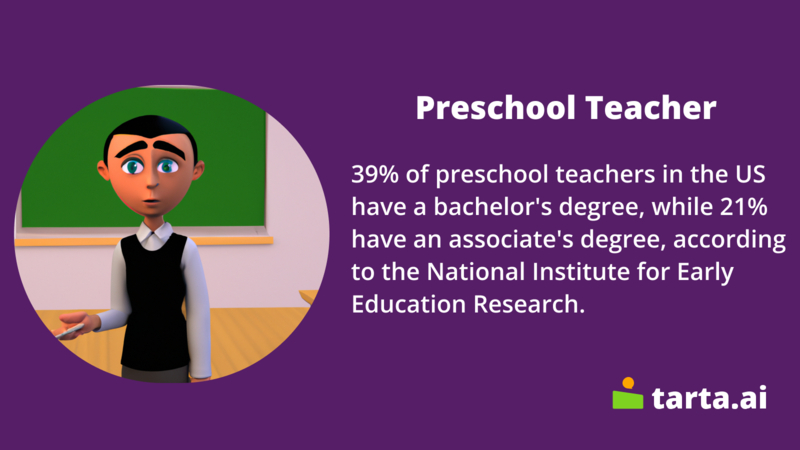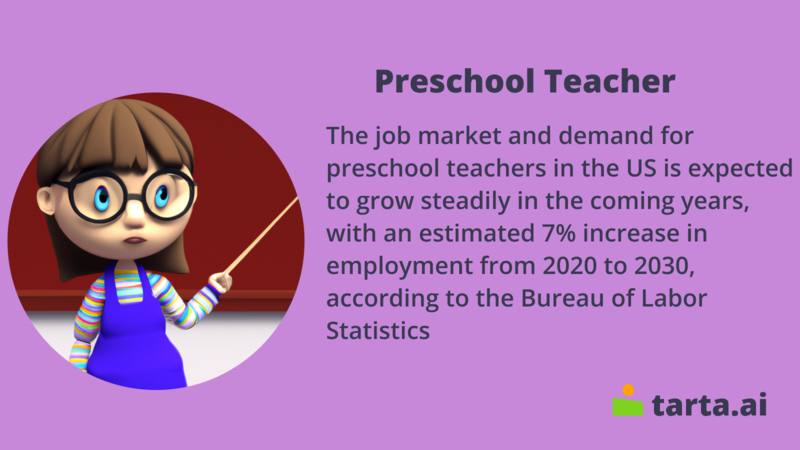Is It Worth Becoming a Preschool Teacher? Understanding Pros and Cons of the Job

A preschool teacher is a trained professional who is responsible for teaching and caring for young children aged 3 to 5 years in a preschool or early childhood education setting. Preschool teachers create and implement developmentally appropriate lesson plans and activities that promote children's learning and social-emotional growth. They provide a safe and nurturing environment for children to learn, play, and explore, and help children develop important skills such as language, socialization, and self-regulation. Preschool teachers also communicate regularly with parents or caregivers to provide updates on their child's progress and offer guidance on how to support their child's learning and development at home.
Requirements
Early childhood education is a critical period in a child's development, where they learn essential skills and form lifelong attitudes toward learning. Preschool teachers play a vital role in this process, providing a nurturing environment where young children can develop cognitive, social, emotional, and physical abilities. To become a preschool teacher, one must meet certain requirements.
The requirements to become a preschool teacher can vary depending on the country and state or province where you plan to work. However, in general, the following are the most common requirements:
- Education: Most preschool teachers are required to have at least a high school diploma or equivalent. However, some states or provinces may require an associate's or bachelor's degree in early childhood education, child development, or a related field.
- Training: Many preschools require their teachers to have specific training in early childhood education, such as completion of a training program, certification or licensure, or continuing education courses.
- Experience: While not always required, many preschools prefer to hire teachers with previous experience working with young children in a classroom or childcare setting.
- Clearances: Preschool teachers are often required to pass a criminal background check, child abuse clearance, and other clearances as required by their state or province.
- Personal qualities: Preschool teachers should have strong communication and interpersonal skills, patience, creativity, and a passion for working with young children.
- Certification: Some states or provinces require preschool teachers to obtain certification or licensure. Certification requirements may include completing an approved training program, passing an exam, and meeting continuing education requirements.
Did you know?
95% of preschool teachers in the US are female, according to the National Center for Education Statistics.
Main Responsibilities and Additional Duties
Preschool teachers’ responsibilities go far beyond just teaching the alphabet and counting to 10. A preschool teacher's role encompasses a wide range of tasks, from developing curriculum to assessing children's progress, creating a safe and engaging classroom environment, communicating with parents, and collaborating with other teachers. We will explore the primary and additional responsibilities of a preschool teacher, providing a comprehensive overview of what it takes to succeed in this vital role.
The main responsibilities of a preschool teacher include:
- Developing and implementing lesson plans: Preschool teachers are responsible for planning and delivering a developmentally appropriate curriculum that aligns with the children's needs and interests.
- Creating a safe and nurturing learning environment: Preschool teachers must create a safe, stimulating, and engaging environment where children can learn, play, and grow.
- Monitoring and assessing children's progress: Preschool teachers must track children's progress, assess their learning, and provide feedback to parents and caregivers.
- Encouraging social and emotional development: Preschool teachers must help children develop social and emotional skills such as communication, problem-solving, and self-regulation.
- Communicating with parents and caregivers: Preschool teachers must maintain regular communication with parents and caregivers to update them on their child's progress and provide feedback on ways to support their child's learning and development at home.
Additional responsibilities of a preschool teacher may include:
- Maintaining a clean and organized classroom environment.
- Keeping accurate records of children's progress and attendance.
- Planning and organizing field trips and special events.
- Collaborating with other teachers and staff members to create a cohesive learning community.
- Providing support and guidance to children with special needs or challenging behaviors.
- Participating in professional development and continuing education opportunities to stay up-to-date on the latest research and best practices in early childhood education.

PHOTO: GETTY IMAGES
Skills
Being a successful preschool teacher requires a unique set of skills and qualities that are needed for the effective education and care of young children. In this chapter, we will delve deeper into the hard and soft skills that are essential for preschool teachers to possess and explore how they can be developed and refined.
Hard skills:
- Knowledge of early childhood development and education theories
- Ability to plan and implement developmentally appropriate activities and lesson plans
- Knowledge of safety and emergency procedures in a preschool setting
- Basic computer skills for record-keeping and communication purposes
Soft skills:
- Patience and empathy
- Strong communication skills with children, parents, and colleagues
- Adaptability and flexibility to adjust lesson plans or activities as needed
- Creativity and enthusiasm for teaching young children
- Strong organizational skills to maintain a structured classroom environment
- Positive attitude and ability to build relationships with children and parents.
Salary
The salary for a preschool teacher can vary depending on several factors, such as the teacher's experience, location, and the type of institution they work for. According to the Bureau of Labor Statistics (BLS), the median annual wage for preschool teachers in the United States was $31,930 as of May 2020. However, preschool teachers in some areas or with more experience may earn higher salaries. Additionally, those working for public schools or government agencies may earn more than those working for private schools or childcare centers. It's worth noting that while the salary may not be the highest, many preschool teachers find the work to be rewarding and fulfilling.
According to the Bureau of Labor Statistics, as of May 2020, the top five states with the highest mean annual wages for preschool teachers were:
- New York: $49,160
- District of Columbia: $48,650
- New Jersey: $43,030
- Hawaii: $41,810
- Connecticut: $41,340
On the other hand, the states with the lowest mean annual wages for preschool teachers were:
- Oklahoma: $24,260
- Mississippi: $24,840
- West Virginia: $25,060
- South Dakota: $25,160
- Alabama: $25,230
It's important to note that these are just averages and individual salaries can vary depending on factors such as experience, education, and the type of institution where the teacher works.
Factors that Influence the Earnings
The salary of preschool teachers can be influenced by various factors such as their level of education and experience, the location where they work, the type of institution they work for, their job responsibilities, the demand for teachers, and union contracts. While salary is an important consideration, many preschool teachers find the work to be personally fulfilling in other ways, such as making a positive impact on young children's lives and helping them develop important skills and knowledge.
There are several factors that can influence the earnings of a preschool teacher, including:
- Education and experience: Typically, preschool teachers with higher levels of education and more experience can earn higher salaries than those with less education and experience.
- Location: The cost of living can vary greatly between different regions, cities, and states. Teachers working in areas with a higher cost of living may earn higher salaries to offset the increased expenses.
- Type of institution: The type of institution where a preschool teacher works can also influence their salary. Teachers working for public schools or government agencies may earn more than those working for private schools or childcare centers.
- Job responsibilities: Preschool teachers may earn higher salaries if they take on additional responsibilities, such as leading a classroom team, supervising other teachers, or coordinating special programs or events.
- Demand for teachers: In areas where there is a high demand for preschool teachers and a shortage of qualified candidates, salaries may be higher in order to attract and retain teachers.
- Union contracts: In some areas, preschool teachers are represented by unions, which negotiate salaries and benefits on behalf of their members.
Ways to Improve Earnings
Preschool teaching can be a rewarding and fulfilling career, but it's not a secret that many teachers in this field struggle with low salaries. Fortunately, there are several ways that preschool teachers can potentially increase their earnings and advance in their careers. We will explore some of these strategies, as well as important factors to consider when choosing a career as a preschool teacher.
There are several ways a preschool teacher can potentially increase their earnings, including:
- Pursuing higher education: Obtaining a bachelor's or master's degree in early childhood education or a related field can lead to higher salaries and more opportunities for advancement.
- Gaining more experience: As preschool teachers gain more years of experience, they may become eligible for higher salaries or promotions to leadership roles.
- Specializing in a particular area: Preschool teachers can specialize in a particular area, such as teaching children with special needs or developing and implementing a STEM-focused curriculum, which can lead to higher pay.
- Seeking out higher-paying institutions: Public schools and government agencies may offer higher salaries and better benefits than private schools or childcare centers.
- Negotiating for higher pay: If a preschool teacher believes they are being underpaid, they can negotiate with their employer for a higher salary or seek out job opportunities with better compensation.
In conclusion, while low salaries can be a challenge for preschool teachers, there are several strategies they can use to potentially increase their earnings and advance in their careers. However, it's important to consider the individual's personal goals, values, and priorities when making decisions about their career as a preschool teacher. Ultimately, with dedication and hard work, preschool teachers can build a good career in early childhood education.

PHOTO: GETTY IMAGES
Additional Benefits
Working as a preschool teacher can be a fulfilling and rewarding career, but it's not without challenges. While salary is an important consideration, there are also many additional benefits that can make a big difference in the overall compensation package for teachers. These benefits can help to provide financial security, work-life balance, and opportunities for professional growth and development. We will explore some of the additional benefits that a preschool teacher may receive at their workplace.
These benefits can vary depending on the employer and the teacher's job status, but may include:
- Health insurance: Many employers offer health insurance plans that cover medical, dental, and vision expenses for employees and their families.
- Retirement plans: Some employers offer retirement plans, such as 401(k) or pension plans, which can help teachers save for their future.
- Paid time off: Preschool teachers may receive paid vacation days, sick days, or personal days to use throughout the year.
- Professional development opportunities: Employers may offer opportunities for professional development, such as workshops or conferences, which can help teachers improve their skills and advance their careers.
- Childcare discounts: Some employers offer discounted or free childcare services to their employees.
- Flexible schedules: Preschool teachers may be able to work flexible schedules, such as part-time or job-sharing arrangements, which can help with work-life balance.
These benefits can help make the job of a preschool teacher more financially and personally rewarding.
Job environment
Preschool teachers work in a variety of settings, from public schools to childcare centers and even in-home programs. Each setting has its own unique characteristics and resources that can impact the teacher's job environment. Additionally, preschool teachers often use a variety of tools and equipment to facilitate instruction and activities, such as educational toys, arts and crafts supplies, and technology. Understanding these settings and tools can provide insight into the daily life of a preschool teacher and the resources available to them.
Description of Settings
Setting | Description |
Public Schools | Preschool teachers in public schools typically teach in classrooms specifically designed for young children. They may have access to resources such as libraries, playgrounds, and technology equipment. |
Private Schools | Preschool teachers in private schools may have smaller class sizes and more flexible curricula than in public schools. |
Childcare Centers | Preschool teachers in childcare centers provide care and education for children from infancy to preschool age. These centers may be operated by private companies or non-profit organizations. |
Head Start Programs | Preschool teachers in Head Start programs provide comprehensive early childhood education, health, nutrition, and parent involvement services to low-income families. They may be located in community centers or schools. |
Home-based Programs | Preschool teachers in home-based programs provide care and education for a small group of children in their own homes. |
Description of Tools
Tool or Equipment | Description |
Educational toys | Toys are designed to help children learn important skills such as problem-solving, social interaction, and language development. |
Arts and crafts | Supplies for art projects can be a fun and engaging way for preschoolers to develop their fine motor skills, creativity, and self-expression. |
Technology | Equipment such as computers, tablets, or interactive whiteboards can be used to enhance learning. |
Classroom supplies | Basic classroom supplies such as whiteboards, markers, pencils, and paper to facilitate instruction and activities. |
FACT
77% of preschool teachers in the US work in child daycare services, while 11% work in public and private schools, according to the Bureau of Labor Statistics.
Work Schedule
The work schedule for a preschool teacher can vary depending on the employer and the needs of the children and families they serve. In general, most preschool teachers work full-time during the school year and have summers off. Some teachers may work part-time or have a job-sharing arrangement with another teacher. Additionally, many preschool teachers work early morning or evening hours to accommodate parents' schedules. It's important to note that while summers off may seem like a perk, preschool teachers often use this time to attend professional development workshops or plan for the upcoming school year. Overall, the work schedule for a preschool teacher can be demanding but also allows for flexibility and time off during school breaks.
Education
Preschool teachers typically need a minimum of a high school diploma or equivalent, as well as certification in early childhood education. However, many employers prefer candidates with at least an associate's or bachelor's degree in early childhood education or a related field.
A Bachelor's degree in early childhood education typically takes four years to complete and covers topics such as child development, curriculum planning, and classroom management. This degree may lead to higher-paying positions or opportunities for advancement within the field.
A Master's degree in early childhood education may take an additional two years of study beyond a Bachelor's degree and can help teachers develop specialized knowledge and skills in areas such as curriculum design or administration. This degree can lead to higher-paying positions and increased job responsibilities, such as program director or education coordinator.
A Ph.D. in early childhood education is a terminal degree that typically takes 4-5 years of study beyond a Master's degree. This degree program focuses on research and may lead to opportunities in academia, policy-making, or consulting.
In conclusion, while a high school diploma and certification may be sufficient for a career as a preschool teacher, pursuing higher education can lead to increased earning potential and more opportunities for advancement. A Bachelor's degree in early childhood education can provide a solid foundation in the field, while a Master's degree can lead to specialized knowledge and skills, and a Ph.D. can open up avenues in research and other areas. Ultimately, the level of education a preschool teacher pursues depends on their career goals and aspirations.

Professional Associations
There are several professional associations for preschool teachers that provide resources, support, and networking opportunities. Some of these associations include:
- National Association for the Education of Young Children (NAEYC)
- Association for Childhood Education International (ACEI)
- National Head Start Association (NHSA)
- National Black Child Development Institute (NBCDI)
- National Association of Early Childhood Specialists in State Departments of Education (NAECS-SDE)
These associations offer various benefits such as professional development opportunities, access to research and publications, conferences and events, and advocacy for the profession. Membership in these associations can be beneficial for preschool teachers looking to stay up-to-date on the latest trends and best practices in the field, as well as to connect with other professionals in their area.
Licenses and Certifications
Preschool teachers in the United States may be required to obtain specific licenses or certifications depending on their state and the type of institution they work for. Some common certifications include:
- Child Development Associate (CDA) Credential: Offered by the Council for Professional Recognition, the CDA credential is a widely recognized certification for early childhood educators. It requires completing 120 hours of formal early childhood education and 480 hours of professional experience, as well as a comprehensive exam.
- Teaching Certification: Some states require preschool teachers to hold a teaching certification, which typically involves completing a state-approved teacher education program and passing a certification exam.
- First Aid and CPR Certification: Many states require preschool teachers to be certified in first aid and CPR, which may involve taking a training course and passing an exam.
- State Licensure: Childcare centers and preschools may require state licensure, which can involve meeting specific education, training, and safety requirements.
- National Accreditation: Accreditation from a national organization, such as the National Association for the Education of Young Children (NAEYC), can demonstrate a preschool teacher's commitment to high-quality early childhood education.
It's important for preschool teachers to stay informed about the specific licensure and certification requirements in their state and industry to ensure they are meeting all necessary qualifications.
Ways of Career Development
The field of early childhood education is constantly evolving, and it is essential for preschool teachers to stay up-to-date with the latest developments and trends. One way to achieve this is through professional development and career advancement opportunities. In this part of the article, we will explore the different ways that preschool teachers can advance their careers and continue their professional growth.
Ways of Career Development | Description |
Continuing Education Courses | Courses, workshops, or seminars designed to help teachers stay up-to-date with the latest developments in early childhood education. |
Professional Development Programs | Formal programs are offered by employers or professional organizations that provide training and development opportunities for teachers. |
Mentoring Programs | Programs that pair experienced teachers with newer teachers to provide guidance, support, and feedback. |
Higher Education | Pursuing a higher degree such as a Bachelor's or Masters in early childhood education or a related field. |
Specialization Certificates | Certificates in specialized areas such as special education, bilingual education, or Montessori education. |
Leadership Opportunities | Taking on leadership roles such as lead teacher, program director, or education coordinator. |
Research and Publishing | Conducting research and publishing findings in academic journals or presenting at conferences. |
Consulting | Providing consulting services to schools, organizations, or government agencies in the field of early childhood education. |
Subfields and Specializations
The field of early childhood education offers many opportunities for specialization and career development. Preschool teachers can choose to focus on a specific area of expertise by pursuing specialized certificates, continuing education courses, or advanced degrees. The following specializations can provide teachers with a deeper understanding of a particular area of focus, leading to increased job satisfaction, higher pay, and opportunities for advancement within the field.
Subfield of Specialization | Description |
Special Education | Special education teachers work with students who have disabilities or special needs, adapting curriculum and instruction to meet individual needs. |
Bilingual Education | Bilingual teachers work with students who speak a language other than English at home, providing instruction in both languages to support language acquisition and academic success. |
Montessori teachers use a child-centered approach to education that emphasizes hands-on learning and self-directed exploration. | |
Reggio Emilia | Reggio Emilia teachers use a similar approach to Montessori education, with a focus on creativity, collaboration, and community involvement. |
Waldorf teachers use a holistic approach to education that emphasizes creativity, imagination, and hands-on learning. |
Specialization Certificates in Early Childhood Education
Certificate Program | Description |
Autism Spectrum Disorder | Certificate programs in Autism Spectrum Disorder provide specialized training for working with children with autism. |
Early Literacy | Certificate programs in Early Literacy focus on teaching literacy skills to young children, including phonics, vocabulary, and comprehension. |
Early Childhood Administration | Certificate programs in Early Childhood Administration provide training in leadership, management, and administration in the field of early childhood education. |
Gifted Education | Certificate programs in Gifted Education provide specialized training for working with children who have exceptional intellectual abilities. |
Teaching English as a Second Language (TESL) | Certificate programs in TESL provide specialized training for teaching English language learners, including strategies for language acquisition and cultural sensitivity. |

PHOTO: GETTY IMAGES
Alternative Careers and Similar Jobs
Preschool teachers may change their job due to reasons such as seeking higher pay or better benefits, lack of job satisfaction, personal or family reasons, burnout, or pursue career advancement opportunities. Here is the list of jobs that preschool teachers usually choose:
- Elementary School Teacher: Teachers who work with children in grades K-6, often in public or private schools.
- Early Childhood Education Coordinator: Professionals who oversee programs and curriculum for young children in daycare centers, preschools, and other educational settings.
- Childcare Center Director: Professionals who manage and oversee operations at daycare centers or other childcare facilities.
- Curriculum Specialist: Professionals who design, develop, and implement educational curriculum for schools or educational organizations.
- Educational Consultant: Professionals who provide advice and guidance to schools, educational organizations, or individual families on issues related to education and child development.
- Family and Consumer Sciences Teacher: Teachers who provide instruction in subjects related to home economics, such as nutrition, child development, and family studies.
These alternative careers and similar jobs may require additional education or training beyond a degree in early childhood education, but can offer opportunities for growth and advancement within the field.
Job Market

Factors contributing to this growth include an increase in the number of young children and a growing recognition of the importance of early childhood education. However, the job market can vary depending on location and specific qualifications, with some areas and positions experiencing more demand than others.
Talking about the employment of preschool teachers - it is expected to grow by 2% from 2020 to 2030 according to the Bureau of Labor Statistics, which is slower than the average growth rate for all occupations. This is due to declining birth rates, which will lead to lower demand for preschool education.
However, there will still be opportunities for preschool teachers, particularly in areas with growing populations or where government funding for early childhood education is increasing. Additionally, there may be increased demand for specialized preschool teachers, such as those with training in special education or bilingual education.
Overall, the job market for preschool teachers in the US is expected to be somewhat competitive, but there will still be opportunities for those with the necessary qualifications and experience.
FACT
According to the Bureau of Labor Statistics, there were approximately 441,000 preschool teachers employed in the US in 2020.
Job satisfaction
The profession of preschool teaching comes with its own set of advantages and disadvantages. While it can be a highly rewarding career path, it also requires a significant amount of physical, emotional, and mental energy. Now we’re going to explore the advantages and disadvantages of working as a preschool teacher to provide a comprehensive view of this profession.
Advantages:
- Rewarding: Working as a preschool teacher can be highly rewarding as you get to see the growth and development of young children firsthand.
- Creativity: Preschool teaching allows for a lot of creativity as you can develop fun and engaging activities that can help children learn.
- Flexibility: Many preschools offer flexible schedules and hours, which can be helpful for individuals with other commitments or responsibilities.
- Job Security: There is a growing demand for preschool teachers, which can provide job security in a stable and growing industry.
- Sense of Community: Preschool teaching often provides a strong sense of community and belonging among teachers, parents, and children.
Disadvantages:
- Low Pay: Preschool teaching is often not highly compensated, with many teachers earning less than the national average for other professions.
- Long Hours: Preschool teachers often work long hours, which can be physically and mentally exhausting.
- High Stress: Preschool teaching can be stressful, as teachers must manage the behavior and emotional needs of multiple young children in a classroom setting.
- Physical Demands: Preschool teaching can be physically demanding, requiring teachers to sit on the floor, lift children, and be on their feet for extended periods of time.
- Emotional Toll: Preschool teachers may become emotionally invested in their students and can experience stress and anxiety when students struggle or experience difficulties.
Government Programs
There are several government programs that provide support and resources for preschool teachers in the United States. Here are some examples:
- Head Start: This is a federally funded program that provides comprehensive early childhood education, health, nutrition, and parent involvement services to low-income families. Head Start also provides professional development opportunities for teachers.
- Child Care and Development Block Grant (CCDBG): This is a federal program that provides funding to states to help low-income families access child care. CCDBG also provides funding for quality improvement initiatives and professional development opportunities for child care providers, including preschool teachers.
- Individuals with Disabilities Education Act (IDEA): This is a federal law that requires public schools to provide free and appropriate education to children with disabilities. Preschool teachers may work with children with disabilities and receive support and resources through IDEA.
- Early Reading First: This is a federal program that provides funding to support the development of early literacy skills in preschool-aged children. Early Reading First also provides professional development opportunities for teachers.
- Race to the Top Early Learning Challenge: This is a federal grant program that provides funding to states to improve early childhood education systems and increase access to high-quality preschool programs. States may use these funds to provide professional development opportunities for teachers.
Overall, these government programs aim to provide support and resources for preschool teachers to improve the quality of early childhood education and promote positive outcomes for young children.
- Employment of preschool teachers is projected to grow as demand for preschool education rises.
- Most preschool teachers work full-time, and many have flexible schedules.
- A bachelor's degree in early childhood education or a related field is usually required to become a preschool teacher.
- Salaries for preschool teachers vary by location, type of institution, and experience, but they tend to be lower than salaries for teachers in K-12 education.
- In addition to classroom teaching, preschool teachers may also work in daycare centers, Head Start programs, or private households.
- Preschool teachers play a critical role in the social, emotional, and intellectual development of young children and must have patience, creativity, and excellent communication skills.
FAQ
What is the job outlook for preschool teachers?
The job outlook for preschool teachers is positive, with employment projected to grow as demand for preschool education rises.
What education is required to become a preschool teacher?
A bachelor's degree in early childhood education or a related field is usually required to become a preschool teacher.
What is the typical work schedule for a preschool teacher?
Most preschool teachers work full-time, and many have flexible schedules.
What is the salary range for preschool teachers?
Salaries for preschool teachers vary by location, type of institution, and experience, but they tend to be lower than salaries for teachers in K-12 education.
What skills are important for a career in preschool teaching?
Preschool teachers must have patience, creativity, excellent communication skills, and a commitment to the social, emotional, and intellectual development of young children.